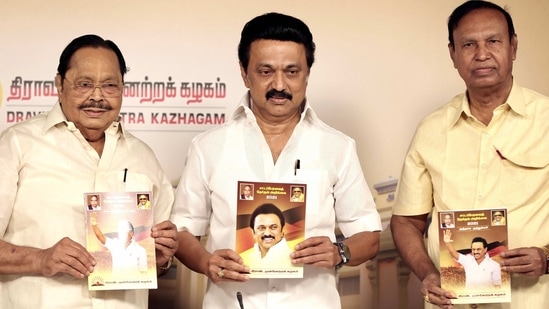Importance of NEET in Tamil Nadu assembly elections
NEET was introduced in Tamil Nadu in 2017 before which admissions to medical colleges took place on the basis of marks obtained in state board exams.
Among the several poll promises made by the Dravida Munnetra Kazhagam (DMK) and the All India Anna Dravida Munnetra Kazhagam (AIADMK) ahead of the assembly polls in Tamil Nadu, those on the National Eligibility cum Entrance Test or NEET stand out. The opposition DMK promised to abolish NEET in the very first assembly session while the ruling AIADMK promised to provide training to aspirants of the medical entrance exam, UPSC, and JEE. NEET is an entrance exam that grants entry into medical and dental colleges across the country.

NEET was introduced in Tamil Nadu in 2017 before which admissions to medical colleges took place on the basis of marks obtained in state board exams.
Why is NEET important in Tamil Nadu polls?
The issue is important as several students from impoverished backgrounds have allegedly died by suicide over the years after failing to clear the exam. The DMK manifesto puts the blame squarely on the Centre as well as the current state government. “The present Union government has introduced NEET and snatched the opportunities of students in Tamil Nadu to fulfil their medical ambitions. Once DMK comes to power, a law will be passed to abolish NEET in the first assembly session and steps will be taken to acquire the President's assent for the law,” it said.
Chief minister Edappadi K Palaniswami blamed the DMK for NEET during a discussion in the assembly last year. Saying NEET was conceived when the United Progressive Alliance (UPA) led by Congress was in power, Palaniswami blamed the DMK, a partner in the UPA. Congress defended itself and said that NEET legislation was passed on August 5, 2016, when the AIADMK’s 37 members in the Lok Sabha and 13 in the Rajya Sabha did not vote against it.
The issue was highlighted for the first time in 2017 after the death of Shanmugam Anitha, a 17-year-old Dalit medical aspirant and daughter of daily wage labour. Anitha had secured 1176/1200 in her state board exams but could not clear the 40% cut-offs mandated by NEET. The exams were challenged in the Supreme Court by the Tamil Nadu government and Anitha pleaded herself in the case. Nalini Chidambaram appearing for the Central Board of Secondary Education (CBSE), the body that conducts NEET, told the Supreme Court that Tamil Nadu cannot stop the exams from taking place and ‘any further appeal against NEET can only be done to God’. The state’s challenge failed, Anitha allegedly took her life nine days after the verdict. A score of alleged suicides and even an incident of self-immolation have been reported in Tamil Nadu since then.
DMK’s emphasis on NEET
MK Stalin while releasing the party manifesto told reporters, “Usually, the DMK’s manifesto is considered as the hero of the elections. This time many are saying our candidates' list is the hero, so I’m releasing the second hero.” Sticking to his words, the DMK chose Dr Ezhilan Naganathan, a leading voice against the NEET, as the candidate for the Thousand Lights constituency in Chennai, as its ‘first hero’. Naganathan has been a vocal critic of NEET, claiming it to be against the basic principles of social justice.
Challenges
The DMK’s promise of abolishing NEET comes with its own set of challenges. The incumbent AIADMK government had tried to get Tamil Nadu exempted from the exams through an ordinance in 2017, which did not receive the President’s nod. The AIADMK had also tried to reserve 85% of the seats in state-run medical colleges for students from state boards but it was struck down by Madras High Court in 2017. In January 2020, the government filed a fresh plea citing NEET as unconstitutional and as of now, six students have filed a case in the Supreme Court asking the state to abide by exam results.






